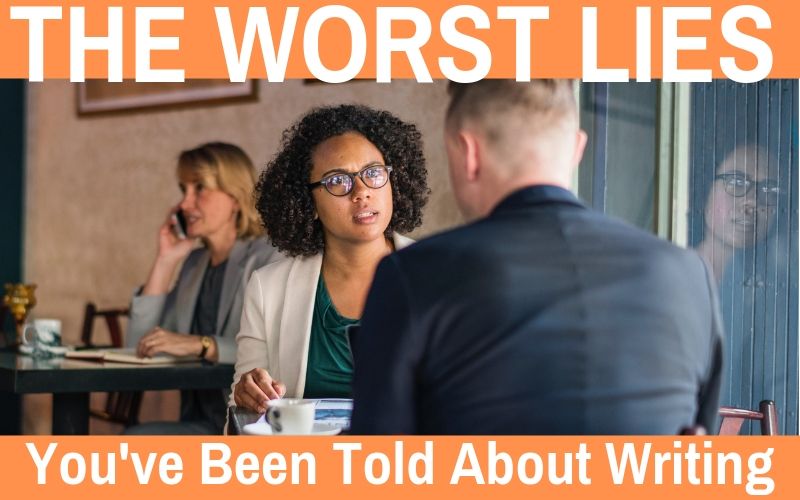.
Much mythology surrounds the vagaries of this business and the paths to success. Some myths we’re told by others; just as many we tell ourselves. Overwhelmingly, they seem to be protective devices to explain away slow years—or even slow careers. Often they become ways to deny how much constant effort it can take—particularly for unknown and/or regional playwrights—to get our work seen. And not just marketing effort, but also work on craft and continually striving to write stronger plays. And also how much luck.
.
Just as there are exceptions to every rule, you may find a bit of truth in some of these myths. That makes sense; that’s how they came to be in the first place. But the real truth is that these myths endure because we want them to be true; we want to believe that the system is fair, that good work always gets rewarded, that OUR work is the good work that should get rewarded, most of all, that there are easy explanations for why our careers aren’t what we want them to be.
.
My goal here isn’t to debate them but to have playwrights take charge of their careers and not leave them to tired rationalizations like these. Luck is a huge factor in the path of any playwright, but there is also a lot of truth to “the harder I work, the luckier I get.”
.
And now to the lies:
.

.
LIE #1: Nobody will produce your play if it’s been produced before.
You know this one. I’ve addressed its mythic status before but it’s so worth repeating.
.
TRUTH: Yes, it is harder to get a second production of a play, but NOT because it’s already been produced. For a more detailed debunking of this dangerous myth, click here. It’s important reading.
.
LIE #2: If only you get into X opp/win X prize, your career will take off.
Early on, I believed this. I’d win something and tell my husband, “This is a big deal.” Only it was never a big deal, because a career is a collection of these things, not just one. There isn’t a single prize or opportunity that is going to launch your career. In fact, most of the biggest prizes and opportunities end up going to people whose careers are doing just fine—that’s WHY they won; they were already doing the work and being recognized for it.
.

.
This is not to say that unknowns can’t win the big prizes. I can think of two playwrights I know who won really big things as complete unknowns, and while the big things were impressive feathers in their caps, they did not lead to the career launch these playwrights expected. In one case, the playwright was so new that they thought they didn’t have to do anything but sit back and wait for offers. They never came because the playwright was still unknown (and, in fact, had won the big thing with a freshman play). It was actually too much too soon and I don’t think they’re even writing plays anymore.
.
TRUTH: There is no one career path and, when success (as you define it) happens, it’s likely it won’t have happened at all the way you thought it would. So many of these lies have to do with us seeing another’s success and thinking we can replicate it when the truth is that paths vary wildly—and most of what creates success is invisible to others.
.
LIE #3: “Proper” dramatic formatting is a thing.
.
TRUTH: It’s not. I mean, don’t send your play in written in Sharpie on gum wrappers, but if your format applies consistency and sense to its choices, it’s not going to be thrown out because it doesn’t adhere to some mythically established standard. (Edited to add: this does not necessarily apply to publishing.)
.
LIE #4: You can’t have a career if you don’t live in New York.
.

.
TRUTH: You can absolutely have a career; what is unlikely is that it will have the same level of visible opportunity as a New York playwright’s career, meaning more potential for off-Broadway and Broadway (there are plenty of NYC playwrights for whom these things don’t happen) and the slew of regional productions that can follow those successes; those things happen far more frequently for NYC playwrights because that’s where the industry is and where the connections are made. Those things can still can and do happen for #PLONY (Playwrights Living Outside New York), but it’s a much harder and rarer path. (Smaller theaters are not “stepping stones” to larger theaters; they simply give you more experience that might eventually help you land a larger theater.)
.
For more on this, read this Howlround summary of what I learned from interviewing #PLONY, and also the actual thirteen #PLONY interviews I did with successful playwrights Eric Coble, William Missouri Downs, Lauren Gunderson, Michael McKeever, EM Lewis, Aditi Brennan Kapil, Don Zolidis, Catherine Trieschmann, Topher Payne, Tammy Ryan, Karen Zacarias, Larissa Fasthorse, and Rachel Lynett. These profiles prove are empirical evidence that every path is different.
.
LIE #5: “Real” writers write every day.
The number of times I hear this even on Official Playwrights is ludicrous. First, I don’t know how people who believe this define “real”—does that mean successful? Good? Earning a living? What? Because I can tell you straight up that some of the most successful playwrights—those who are earning a living, have won huge prizes, and have been on Broadway—do NOT write every day. I know because I’ve interviewed them and they’ve told me. Some do—David Ives and the late Pete Gurney come to mind—but the overwhelming majority write in spurts. So don’t let this get in your brain and bring you down.
.

.
TRUTH: If you’ve got plays, you’re a real writer, no matter how they got written.
.
LIE #6: You need an MFA to be a successful playwright.
What people mean when they say this is “an MFA from the right program will make your career,” because everybody knows there are plenty of playwrights who found success without any MFA at all. And loads more who have MFAs—even from the “right” programs—who are in the same submission trenches with the rest of us. Yes, there are disproportionate number of successful (largely) NYC playwrights who have MFAs from a handful of programs, but have you ever stopped to consider all those who went to school with them who haven’t ever been heard of?
.
TRUTH: What an MFA in general can do for you is make you a better playwright in every way. What a connected MFA program can provide for talented playwrights who work hard is advocates and connections—which can sometimes lead to the right set of circumstances to kickstart a career. It is not a golden ticket.
.
LIE #7: New plays don’t sell.
This actually means new plays are harder to sell. But when a new play is strong and lands, word spreads—fast. Unfortunately, the word most people listen to is the New York Times, but that doesn’t mean new plays can’t do well on a local level. They often do; it’s just that when New York doesn’t know about it, word usually doesn’t spread in a way that begets the kind of residual, trickle-down success a New York hit can generate.
.
TRUTH: New plays are unproven, which often means they assume greater risk. It’s that risk that prevents them from being done, not the fact that they can’t sell.
.
LIES #8 and #9: It’s a matter of time.
Every no gets you closer to a yes.
I like to call these the “hang in there” lies. Of course the more you send out your work, the better your odds—in theory. But if you are getting only nos or your proportion of yeses is far disproportionate to the amount of work you’re sending out—and you’d like it to be more (I say this because there are people who are willing to make 300 submissions in return for one tiny yes)—it’s probably time to look at the work itself.
.

This is the thing we never talk about: what if the work is not competitive? Because all the submissions in the world can’t overcome work that is not competitive, not when opportunities are getting hundreds upon hundreds of plays. Competitive can mean many things and if the play is not landing, it’s on us to figure out why (this blog post on second productions can help identify some factors).
.
What is true is that for those without clear paths to production (i.e. we’re not so known that theaters come to us interested in our next plays) is that it’s a numbers game—which is not the same as it being a matter of time. In a numbers game, a competitive play will eventually get recognized because the more you send it out, the more likelihood there is that it will connect with a decision-making reader. But if the play is not competitive, that may never happen no matter how long or often you send it out. If you’ve sent a play to a hundred opportunities and haven’t gotten so much as a nibble, it’s probably the play. (We all have those; not every play is a masterpiece!) Because even with a competitive play, the return rate (defined as any kind of positive response) is generally not more than 10 percent.
.
And before I get attacked in the comments, of course I know that art is subjective and that there are plays that are perhaps ahead of their time or play better than they read etc.; that’s not the kind of work I’m talking about and I think it’s a dangerous delusion if I convince myself that the play nobody wants is one of these rather than taking a cold hard look at the play itself.
.
LIE #10: The play is the only thing that matters aka every good play will get produced.
This is a tough one. For a play that is so brilliant, so above everything else, and so obviously those things that nobody can miss it, this may be true. Most of us aren’t writing those plays. Most plays we go see aren’t those plays. But many of us do have plays that have gotten a lot of positive recognition and remain unproduced. (I should add that this lie is especially egregious when it applies to large cast plays and plays with major tech requirements; smaller and easier does matter (see previous link about second productions.) I have a Kilroys play that’s still unproduced… which only goes to show you how much it’s not just about the play.
.

.
TRUTH: Not all plays that get produced are good, and not all good plays get produced. There are myriad factors that get plays to the stage—popularity of concept/title, relationships, money, timing, etc.—and if you’re an unknown playwright not interested in self-production, luck and hard work are also big ones.
.
And I guess that’s the point of this entire post and the biggest truth of all: success is combination of hard work, talent, and luck, and lack of it is because one or more of these elements is missing. As playwrights, we have total control over the first, some control over the second, and zero control over the third. All we can do is be sure that we’re doing the hard work and talent part as best we can so that when luck arrives, we’re ready.
.
(don’t forget to check out my new website by clicking on the home page!)
–Please follow me on Twitter @donnahoke or like me on Facebook at Donna Hoke, Playwright.
–Playwrights, remember to explore the Real Inspiration For Playwrights Project, a 52-post series of wonderful advice from Literary Managers and Artistic Directors on getting your plays produced. Click RIPP at the upper right.
–To read #PLONY (Playwrights Living Outside New York) interviews, click here or #PLONY in the category listing at upper right.
–To read the #365gratefulplaywright series, click here or the category listing at upper right.
–For more #AHAinTheater posts, click here or the category listing at upper right.
Extraordinarily useful, every word (I’m a New Yorker, I don’t have an MFA, and I do write every day; and it all speaks to me.) But at the beginning of the annual submissions season, every playwright should read this one astute statement aloud, several times:
“This is the thing we never talk about: what if the work is not competitive? Because all the submissions in the world can’t overcome work that is not competitive, not when opportunities are getting hundreds upon hundreds of plays.”
Know thyself. Know thy work.
And if it’s not competitive, figure out why. That’s the hard one…
Thanks for a thorough and balanced view of how things work. Adjusting expectations to reality is a difficult process.
In some ways, I feel it’s almost more a view of how things DON’T work lol.
Donna, thank you for the reality check. As I gain experience I do go back and revisit older plays to see whether I can make them better, to sharpen the talent part of it if I can.
I once saw a production of mine that hadn’t been produced in five years; I cringed and went home and cut five pages with ease.
Terrific article! It is hard to admit when a play just isn’t working and it’s even harder to dismantle and rewrite it OR cut one’s losses and move on, but either option is ultimately better than continuing to submit the original, non competitive, piece.
Thank you, and it is! I think it takes years to learn that and to realize that every playwright has unproduced plays lying around.
Concise, hard-hitting, encouraging, straight-forward, and synthesizes so much. We come into this world of playwriting and, I don’t know about others, but it’s all Greek to me! This is a wonderfully grounding and insightful piece! Thanks, Donna! Would have loved to have read this a couple years ago, so I know this will help so many others.
Thank you so much! I’m glad it’s helpful!